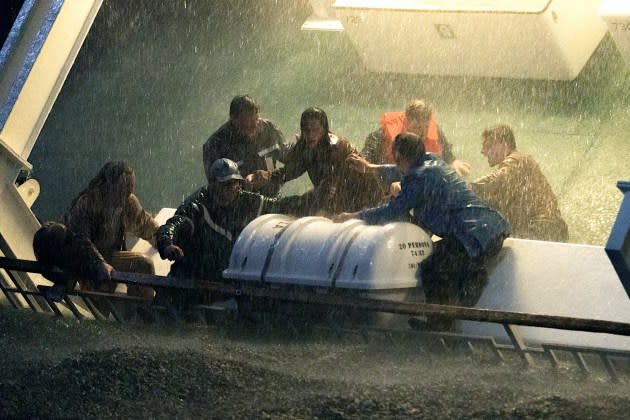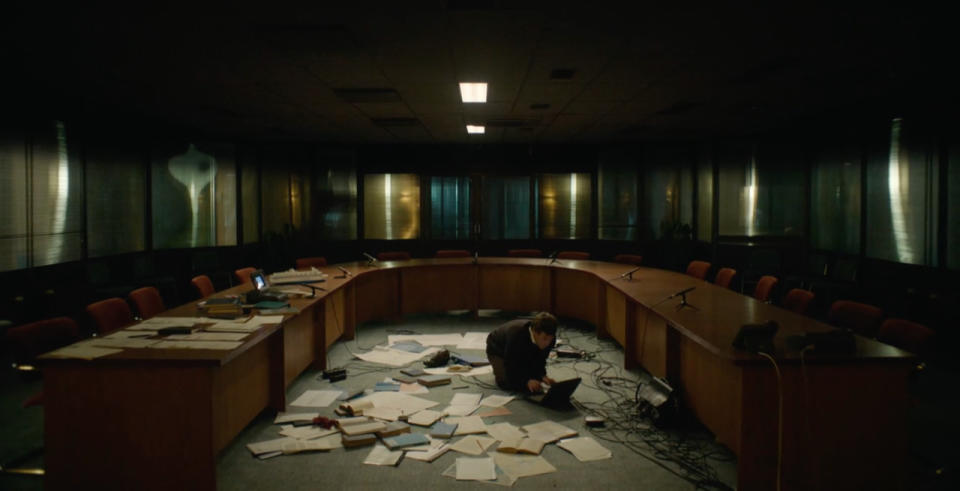‘Estonia’: How Creatives Behind One Of Scandinavia’s Most Expensive TV Series Of All Time Took An Ethical Approach To Ferry Tragedy Drama

EXCLUSIVE: Creatives behind Estonia – one of Scandinavia’s most expensive drama series of all time – have opened up about the ethical issues surrounding a show spotlighting a tragedy that claimed the lives of 850 people.
Director Måns Månsson, whose past credits include Chernobyl and Snabba Cash, described the cruiseferry’s sinking as a “total national trauma” that needed to be approached with the utmost sensibility, given that authorities are still investigating 30 years on.
More from Deadline
“We Scandinavians tend not to be involved with wars so rarely have loss of life on this scale,” he told Deadline, as the show distributed by Beta Film and made by several indies for a number of European networks prepares for launch at the Toronto International Film Festival’s Primetime program.
With budget estimated at around €15M ($16.4M) across eight episodes, Estonia (see an exclusive clip below) charts what happened after midnight on September 28 1994 when a catastrophic storm near Finland caused the sinking of the enormous ship – one of the worst tragedies to befall such a vessel since the Titanic – claiming 852 lives.
As the tragedy unfolds, pressing questions surface: How could this happen, was it human or technical failure, and who can be held accountable? The investigation committee, including acclaimed marine engineer, yet novice inquirer, Henri Peltonen, is subsequently determined to unveil the cause of the disaster.
“I remember hearing of the accident when visiting my family,” said showrunner Miikko Oikkonen. “We heard the ferry had sunk and my father’s response was ‘No way, this is not possible.’ Those words have burned in my mind.”
Conspiracy theories

Tackling the ethical issues surrounding the story was Oikkonen’s biggest priority. He wanted to avoid the pitftalls that have beset previous shows about disasters by ignoring the mountain of conspiracy theories that exist about the tragedy, conspiracy theories that would likely resurface in the era of Covid-19 and Donald Trump.
“I started in 2019 when 25 years had passed since the accident and found 14,000 documents in the Finnish national archive,” he explained. “It took me one-and-a-half years to figure what to do about this topic. I decided there were two things I was not willing to do: I wouldn’t just tell a story about the disaster and I wouldn’t go down the direction of listening to the theories during the times we were in.”
For this reason, the team took a similar approach to the makers of Chernobyl by focusing on different precincts’ response to the disaster, such as the police, investigating committee and families that suffered.
“The spine of the show is the investigation,” added Månsson. “Through this, we discover bits and pieces of what actually transpired on the night.”
One major complication that held the investigation back over such a long period was the pan-European nature of the accident, the fact that it happened on a Finnish-built cruiseferry travelling between Sweden and Estonia and sinking in the Baltic Sea.
Taking a collaborative approach was a boon, however, when it came to producing Estonia, which was made for Finland’s MTV and Sweden’s TV4, while Germany’s ProSiebenSat.1. has pre-bought.
“I don’t think we could have pulled this off if it was a 100% Swedish project,” added Månsson. “Everyone would be tiptoeing around the subject too much. But the outside perspective of having a Finnish writer made us brave in a way to dare engage with something that was initially so sensitive.”
Having several players involved helped boost the budget in today’s highly-competitive scripted market but Oikkonen rejected the notion that additional funds influenced the editorial. “We needed some more money of course but it is not part of the storytelling,” he added. “The reality of the disaster and its repercussions were way bigger than budgetary pressure.”
Discovery filmmakers fined
Making a scripted series out of the tragedy allowed the creators to avoid going the way of a Discovery documentary crew in 2019. Back then, two filmmakers sent a remote-operated vehicle to film the wreck and they discovered previously unknown damage to the hull, but they were found guilty of disturbing the wreck last year and were fined.
According to Månsson, it was this incident that reopened the investigation and could lead to answers when it reports back later this year. “It was that documentary that removed the law protecting the wreck and opened it up again,” he said. “But a doc is different to a drama and we didn’t visit the site or anything like that.”
The pair are hopeful that a U.S. buyer will swoop for the series once it launches sales at Mipcom Cannes, in a similar vein to last year’s Beta/ZDF hit The Swarm. “The shipwreck is almost an eternal genre so I think we have a lot to say for every kind of audience,” added Månsson.
And while acknowledging that the dual writer/actor strikes are an “important issue and we are not trying to compete with the U.S.,” Oikonnen floated the notion that a positive side to the labor action could be “some room for European shows in the U.S. or other English-speaking markets.”
The show will launch in its various territories later this year. It is produced by Fisher King in co-production with Panache Productions & La Compagnie Cinematographique, Amrion Production, Kärnfilm and Beta Film for MTV and TV4.
Best of Deadline
2023 Premiere Dates For New & Returning Series On Broadcast, Cable & Streaming
Venice Film Festival 2023 Photos: The Red Carpet Premieres & Closing Ceremony Winners
SAG-AFTRA Interim Agreements: Full List Of Movies And TV Series
Sign up for Deadline's Newsletter. For the latest news, follow us on Facebook, Twitter, and Instagram.

